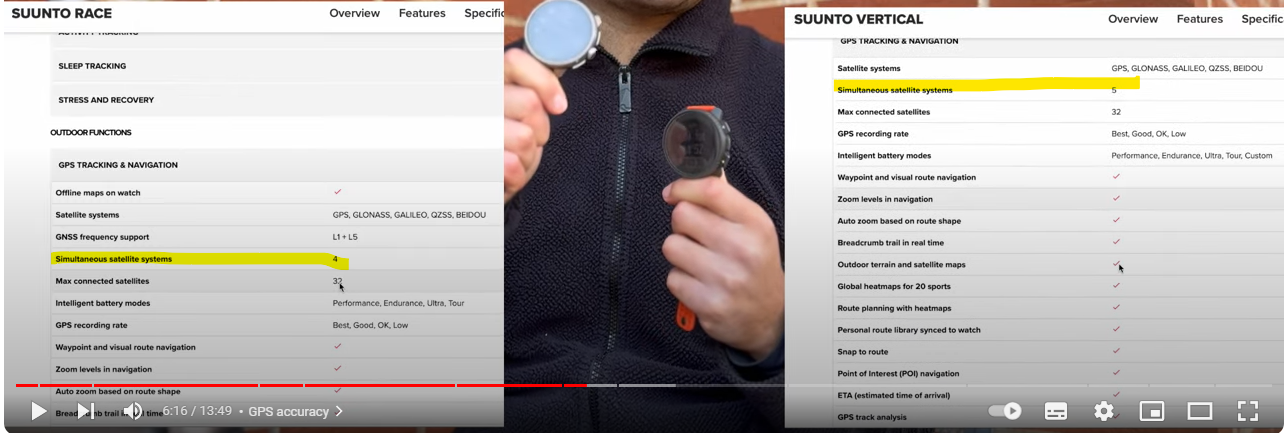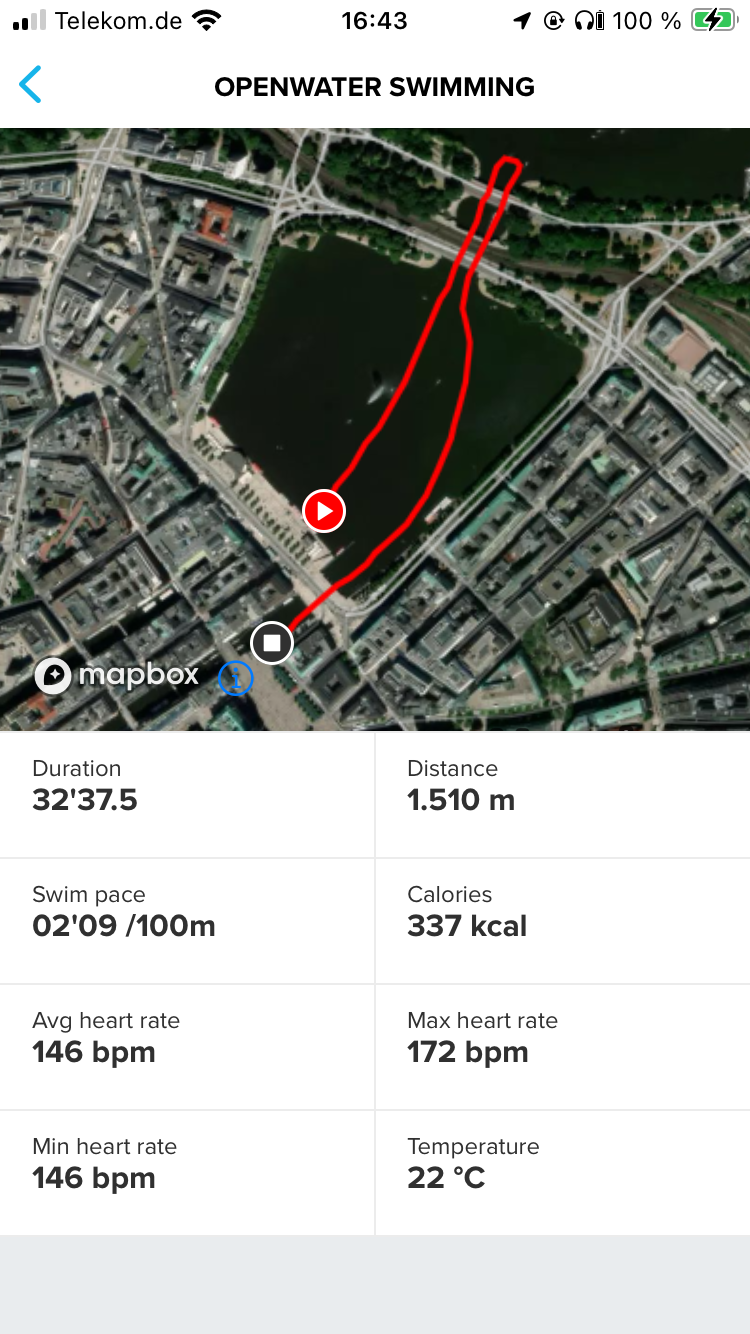Suunto Race and openwater swimming
-
@sartoric good point. That limit is there for something. But after all these months we are also seeing that seems easy to get a 45 hours battery duration, instead of the 40 hours with multiband enabled.
And there’s also the fact that the SV seems to have better tracks, specially in openwater. Perhaps removing that lock it’s just an update of the firmware of the Sony chipset (I don’t know of course).
But with everything we know now, It seems pretty interesting if Suunto could remove that limit and see if we can get the perfect tracks and something like the openwater fix the SV has, and probably at very low cost.
Just debating about something we don’t know of course. Really interesting. -
Last week I had a triathlon race. The open water track from my SV looks very good and clean. I’m impressed. The difference in distance between offical and the watch was 50m (950m vs 900m(SV). I swam perfectly at the buoys, this time perfectly managed to shoot with navigation in the water.
-
@Maryn thanks for that report! In fact, similar as the review I posted about the SV. If you scroll down to openwater in that review, the accuracy is very good when using the SV.
In that half distance Ironman swim the Suunto Vertical registers 1.938 meters and the Garmin Forerunner 965, 1.914 meters.
There’s a difference of only 24 meters (to make an idea, that’s about a 25 meters pool in near 2 kilometers), and those meters depend also how you are swimming.
So perhaps 1.938 is more real and accurate than 1.914 in your swim. So, yes, really impressive the accuracy of the SV (and not really mediocre as others suggested in the past)So if Suunto has openwater fixed for the SV and they share the same GNSS chipset in the Race, there should be a fix for the SR.
The SR seems to report a bit less accurate tracks (when not openwater) and even worse when openwater.And there’s also that lock in the Race we were talking about…
-
@dreamer_ did you check the race with current SW?
-
@Maryn I have the SV but I’m also interested in the SR. The thing is that SR’s aacuracy reports are not as good as SV’s, specially when openwater. I understand the reports are better than some reviewers said in the past, but not as good as SV’s reports.
I don’t know, of course. But there’s something there that makes accuracy different between both watches.
-
By the way did you try to use the polar verity sense close the SV during swim (under the swim suit)? I wonder if it will work in water because of the extra BT antenna used in verity sense. Then you can have pretty good HR accuracy during swim

-
@Maryn I don’t have the verity sense but I have a Polar H10, a Garmin HRM Tri (both chest straps) and a Coospo HW9 arm band. The Coospo band is a 20$ arm band that has very nice reviews (comparable to the Polar Verity Sense https://www.correrunamaraton.com/coospo-hw9-review-opinion/?utm_content=cmp-true ). I can highly recommend this arm band for running, but is not valid for swimming.
The thing is that BT does not work underwater. The Polar H10 has memory to sync the HR data after the activity but it does only work inside the Polar ecosystem or with Polar Flow. And that means that you end having the activity in the Suunto App and the HR in Polar Flow. So if you don’t have a Polar watch, you need a chest strap that is compatable with the brand you are using.
So,as far as I know, the only way to have good HR data using a Suunto watch, is with the Suunto chest strap (which I don’t own)
-
@sartoric @isazi @Maryn I was wrong with my assumptions about the simultaneous satellite systems. It seems there’s a correction at Suunto’s web site:

I have seen reviews like this one: https://www.youtube.com/watch?v=_4OK9-jUwZA&t=714s
Where there are differences in that number:

But it does not seem true (at this moment). At least in the Spanish site.
-
@Egika sorry for the mention. It’s just I have read you swim a lot in other posts and I think you have very good experience here. Do you have reports of SR vs SV’s accuracy? Something we can see. It’s just there’s nothing but DCR’s review (outdated, since lasts firmware updates) and I think It’s good to know about SR’s accuracy on openwater.
Thanks
-
@dreamer_ Actually I have no swim recorded with Race. With Vertical and 9PP I have lots.
Accuracy with both has been superb for me (normal amateur freestyle).
Like here the swimming leg of a triathlon wich is supposed to be 1500m and passed under a bridge 3 times (the last bridge was like 50m long, narrow and dark). This is Vertical. I would think Race should behave similarly.
-
@Egika thank you so much!!
-
@mlakis Polar Optical HR armband works brilliantly with Suunto Race in pool and open water swimming. I use it for running, cycling and swimming.
-
@freddubai I didn’t expect that.
Have you tried the arm band with a wetsuit? It is always said that bluetooth does not work well underwater (light pulsed HR is not good with water and the signal transmision does not work well too). That’s why the cheststrap is usually needed for swimming and you need a cheststrap that can save in memory the data to transmit that data after the swims. -
@dreamer_ I have not used it with a wetsuit, but the Polar is highly reliable. Polar also provides a holder that fits onto your goggle strap so that the sensor touches your temple - this is actually recommended when you need a wetsuit.
-
@freddubai the thing is that I have the H10 and the HRM Tri. Both have built-in memory for the swims but the first one only syncs inside Polar Flow and the other only syncs with your Garmin watch after the swim. I like the idea of the arm band if it works (I have a Coospo HW9 but that band is only IP67).
-
Just to respond on this…
I did some tests (across 14 GPS watches) the week of April 20th. There haven’t been any GNSS updates to the watch since then.
Here’s the first test, where the Suunto Race was pitted against the Garmin Forerunner 265: https://analyze.dcrainmaker.com/#/public/8992e4ba-6881-4a6f-6a42-34a8f974725e
You can see it struggled quite a bit, compared to the reference track (swim buoy), and the Forerunner 265.
Then, after all 14 watches were done, I had a second round, the ‘Failboat Finale’, giving the two worst-performing watches a second chance at things. This was the Suunto Race vs the COROS Vertix 2S. (Note: The Suunto Vertical did OK, not as great as others, but enough to not end up in the bottom two).
Results: https://analyze.dcrainmaker.com/#/public/9e25ec07-ec0f-4919-6485-08d4179607da
It somehow managed to perform even worse on that test, despite being an easier test. It got things wrong before it even got to the usual brief treading water test (which, any GPS watch should be able to do just fine, and recover from 15-30 seconds of treading water, as if waiting for someone to catch-up, waiting for a boat to pass, etc…).
Again, I’m not aware of any changes in the GNSS side of things since that test, and I know Suunto engineering did see the data as part of my COROS Vertix 2S review.
-
@dcrainmaker A 14 watch test with the Race performing so bad, seems important enough to understand there’s something here that Suunto should look at.
Thank you so much for taking your time to post here and for your fantastic work Ray.
-
Just to note the new firmware of the Race seems to have GNSS accuracy fixes. Has anybody tested it on openwater?
Despite I have the Vertical, I’m thinking in the Race S as an smaller watch but then it seems both Race models have the same price for a few days here and there’s the doubt. Openwater is the only thing I remember the Race was not doing ok, but I don’t know now if that issue has been finally fixed.
-
Any updates on what @dreamer_ had mentioned?
-
Vertical, Race and Race S have slightly different antennas.
Tests show, that the SNR is not consistently better of worse for one or the other model.
As you can see from my above activities, I have never had any problem with all Suunto models and got perfect tracks and distances.
It maybe is a personal swimming style issue as well…Next FW update will also contain GNSS improvements again - just for me myself there is not much to be improved
